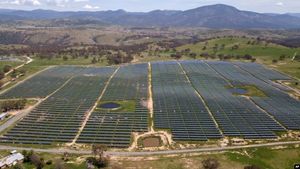Madagascar's resource-rich landscapes are once again buzzing with activity as Sumitomo Metal Mining Co. announces the resumption of its nickel and cobalt mining operations. This development marks the end of a two-year hiatus for the firm at its Ambatovy project, which is situated approximately 80 km east of the capital city, Antananarivo. The looming questions about sustainable development and the environmental impacts of mining remain central to the conversation around this resumption.
For Sumitomo, this recommencement is not just about tapping back inta the lucrative market for these metals but also about stabilizing their production capabilities. The halt had occured due to complications arising from the COVID-19 pandemic, compounded by supply chain disruptions and fluctuatin' global demand. With the renewed mining efforts, Sumitomo is hopeful about enhancing its output capacity, focusing on meeting its obligations to clients and existing contracts.
Nickel and cobalt are key components for various industries, particularly for rechargeable batteries, making them hot commodities, especially with the rise of electric vehicles and renewable energy technologies. The global drive toward electrification has put Madagascar's rich deposits of these metals under the spotlight, with investors payin' close attention. According to market analysts, the demand for both resources is anticipated to increase significantly, driven by rapid advancements and innovations within the tech industry.
Upon resuming operations, Sumitomo plans to ramp up production to capture this growing market. Their approach includes implementing advanced extraction techniques to not only maximize yield but also improve environmental footprints. The company has reiterated its commitment to responsible mining practices, aiming to mitigate any potential environmental impacts of their operations. This involves engagement with local communities, adherence to environmental regulations, and initiatives to reduce carbon emissions.
But it's not all smooth sailing. Local communities have raised concerns over the environmental impact of mining activities. There's deep-rooted anxiety about potential pollution and the threat to local biodiversity. Environmental activists argue for thorough assessments to understand the repercussions of renewed mining operations. The government of Madagascar, under pressure from both local and international stakeholders, faces the challenge of balancing economic growth—forging paths toward development—while ensuring environmental sustainability.
Madagascar’s government has long recognized the importance of the mining sector for national development. With the resumption of Sumitomo's operations, there's hope for economic upturns. Mining activities are expected to create job opportunities and inject foreign investment back inta the country, revitalizing communities previously reliant on these industries. The government is also accentuating the role of responsible mining by setting stricter guidelines for benefits to be shared with local communities.
While the resumption brings promise of revitalization, there are notable caveats. Environmental repercussions tied to mining practices have sparked discussions about the need for more sustainable practices not just from miners like Sumitomo but across the board. For example, some advocates are pushing for certifications from independent environmental bodies to promote transparency and community trust.
For its part, Sumitomo is integrating corporate social responsibility measures int the heart of its operational strategy. This includes commitments to invest significantly back inta the communities and infrastructure, aiming to create synergies around health, education, and local economy stimulation. Such measures could pave the way for ensuring sustainable mining practices become part of the larger economic framework.
Reopening the Ambatovy project is expected to contribute roughly $800 million to the national economy, highlighting the significant fiscal lift it offers. Experts are observin' closely if Summito's return will boost the nation’s mining sector and how it aligns with global trends striving for greener alternatives.
The future remains uncertain, but the combination of increased demand for nickel and cobalt and new regulations on sustainability could reshape Madagascar's mining industry. What’s clear is the delicate balancing act Madagascar must pursue: fostering economic growth and development without compromising the health of its unique ecosystems and local communities.
With investor interests reigniting on this front, Madagascar stands at the crossroads of opportunity and responsibility, as the world watches how this mining renovation plays out.



